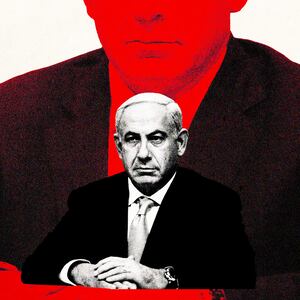JERUSALEM—In Jerusalem, standing beside Israeli Prime Minister Benjamin Netanyahu, U.S. Secretary of State Antony Blinken uncharacteristically minced no words: The United States, he said, wanted to stress “our support for core democratic principles and institutions, including respect for human rights, the equal administration of justice for all, the equal rights of minority groups, the rule of law, free press, a robust civil society.”
It was the sort of cautionary notice Blinken might have issued in authoritarian Turkey or in Poland, but never before heard from a senior American official in Israel. It spotlighted almost all the parts of Israeli governance Netanyahu plans to dismantle as part of a vast judicial blitz which would leave him, as the nation’s chief executive, with almost absolute power.
Then Blinken pulled a final arrow out and—referring to the massive protests that have emerged since Israel’s long-time leader returned to power on Dec. 29—shot it straight at Netanyahu: “And the vibrancy of Israel’s civil society has been on full display of late.”
Netanyahu and his allies, including Yair, his right-wing troll son, slam the protests as “anti-Israeli” subversion funded by “foreign money.”
In addition to street demonstrations, Netanyahu’s radical overhaul has been met with a wall of condemnation from every sector in Israel’s establishment, ranging from the entire judiciary to bank and university presidents, academic leaders, tech titans, business leaders, economists, doctors, teachers, and more than 170 mayors.
Netanyahu’s all-out assault on Israel’s judiciary would neuter the judiciary, void Supreme Court rulings, and accord him almost total authority over the levers of government. Israel does not have a written constitution, and Netanyahu is threatening to revoke some of the “Basic Laws” that guarantee civil rights.
Mordechai Kremnitzer, a renowned Israeli jurist and professor of law at the Hebrew University, told The Daily Beast that Israel is undergoing “an attempted régime change by a political majority, which would transform the country from a liberal democracy to a country with an authoritarian, populist, nationalist and religious system with many characteristics of absolute power for majority, and no mechanism of judicial review.”
Netanyahu’s finance minister, who recently described himself as a “fascist homophobe,” and hopes to impose “the law of the Torah” on Israel, has submitted to parliament a law which would allow faith-based discrimination. Other ministers are acting to usurp the power of parents and regional and municipal authorities over educational programming, to deny the right of traditionally Arab-majority political parties to run for the Knesset—Israel’s parliament—to limit the right to strike, restrict the right of journalists to publish leaks, and entirely do away with Israel’s public broadcaster, Kann News.
‘The Threat From Within’
On the international front, his government has announced plans to, de facto, rescind Israel’s recognition of most Jewish communities in the world as properly Jewish, and to curb Israel’s unique immigration law, which was established 75 years ago so as to guarantee Jews a homeland should they be threatened by antisemitism in the lands of their birth.
And that’s not half of it: Last weekend, an Israeli army incursion into the West Bank city of Jenin resulted in the deaths of nine Palestinians, including at least two innocent bystanders, and triggered a bloody weekend in Jerusalem. Seven Israelis were killed in two terrorist shooting attacks perpetrated by east Jerusalemites: a 21-year-old who was shot dead by Israeli police, and a 13-year-old whose family home has been sealed off under orders of Netanyahu’s Minister for National Security, Itamar Ben Gvir. Ben Gvir, a rabble rouser with dozens of hate crime convictions, led a late night posse chanting “death to the terrorists!” after the first attack.
Danny Yatom, a retired major general and former head of the Israeli intelligence agency Mossad, and one of hundreds of former police and military officers who have joined the resistance to Netanyahu’s scheme, told The Daily Beast he considered the number one threat confronting Israel to be “the threat from within: the fissures and cleavages tearing apart Israeli society, which in the past has always evinced solidarity when confronted by danger.”
“The divisiveness weakens Israeli cohesion, and in the eyes of our enemies, the events taking place in the country are a sign of weakness.”
Last week, three tech and financial services companies announced they were withdrawing from Israel, citing rule of law concerns, only to be followed this week by Tom Livne, founder of software giant Verbit—valued at $2 billion—who said he intends to leave Israel in protest.
Netanyahu has lost a top Bank of Israel official and three ambassadors who resigned in protest at his government’s radical policies. He also lost a crucial political ally, Minister of the Interior and Health Minister Aryeh Deri, whom the Supreme Court ruled unfit due to a recent conviction for tax evasion.
Supreme Court Chief Justice Esther Hayut warned Netanyahu of “a fatal blow to Israeli democracy,” and was slammed as an enemy of the state. Two former governors of the Bank of Israel and the current office-holder, Amir Yaron, a Netanyahu appointee, cautioned Netanyahu that erasing checks and balances will negatively affect foreign investment in Israel, a crucial column of Israel’s booming economy.
Netanyahu’s online followers immediately branded Yaron “a leftist.”
On Tuesday, at a public event, Netanyahu himself accused opposition leader Yair Lapid, the immediate former prime minister, of “harming Israel’s economy.”
Netanyahu is barely paying lip service to Israel’s existing laws: his coalition already submitted a bill, popularly called the “Deri Law,” which would override the Supreme Court ruling to reinstate barred ex-convict Deri in Netanyahu’s cabinet and provoke an unprecedented constitutional crisis in Israel.
Netanyahu and his allies have wasted no time in employing methods that, under Israel’s current laws, are brazenly illegal. He continues to invite Deri to cabinet meetings, and his replacements in crucial offices of state have yet to show up for work.
‘The Shock Doctrine’
Netanyahu himself was indicted on charges of bribery, fraud and breach of trust in 2019, and remains on trial. Attorney General Gali Baharav-Miara’s warning on Thursday—in which he compelled Netanyahu to immediately stop any activity relating to the judiciary while proceedings against him are underway—led Simcha Rothman, a key Netanyahu ally, to threaten to fire her for sedition.
“It is no exaggeration to say that this entire crazy initiative has been engineered by Bibi Netanyahu to escape the legal predicament that still confronts him,” said Yatom. “He wants quite simply the power to influence the selection of judges—the judges who will hear his appeals.”
Israeli journalists reporting on the pandemonium can’t keep up. Orli Barlev, an independent journalist closely linked with the public protest against government corruption, told The Daily Beast that “Netanyahu's media people are on them all the time. A reporter says one thing and is swarmed by spin from Netanyahu’s online army, or even threatened. Journalists haven’t yet assimilated the fact that Netanyahu is a proven liar.”
After a vertiginous month, Israelis can barely catch their breath—which is, according to constitutional law professor Adam Shinar, the whole point.
“It’s the shock doctrine,” he told The Daily Beast. “It’s a hugely important concept in understanding politics.”
The idea, he said, is long used by aspiring authoritarians to flood the public space with so many drastic transformations that “by the time the opposition gets to its feet, it’ll all be over.”
Netanyahu, for example, has not tried to persuade Israelis of the need for any specific, defined reform.
Instead, he is “trying to push through the pipeline many changes at once, each very complicated yet condensed into a few pieces of legislation—each of which merits separate debate. The government is doing this as fast as possible so the opposition time to organize,” Shinar said.
“What are you going to fight first? While you ask yourself that question, they’re five miles down the road with even more radical changes.”
Roee Neuman, a leader of the pro-democracy protest movement, told The Daily Beast he is “getting calls from journalists and lawyers and civil society people who are genuinely afraid of being criminalized and being jailed if this reform/coup is enacted.”
“There will be no reset if this happens,” he said. “It is terrifying.”







